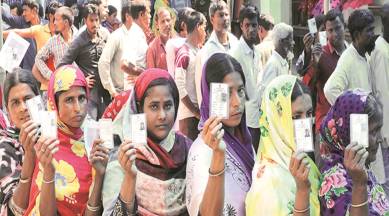Ravik Bhattacharya is the Chief of Bureau of The Indian Express, Kolkata. Over 20 years of experience in the media industry and covered politics, crime, major incidents and issues, apart from investigative stories in West Bengal, Odisha, Assam and Andaman Nicobar islands. Ravik won the Ramnath Goenka Excellence in Journalism Award in 2007 for political reporting. Ravik holds a bachelor degree with English Hons from Scottish Church College under Calcutta University and a PG diploma in mass communication from Jadavpur University. Ravik started his career with The Asian Age and then moved to The Statesman, The Telegraph and Hindustan Times. ... Read More
Premium
Cooch Behar: ‘Educated, without jobs… voted to change situation,’ say voters
The enclaves include Poaturkuthi, Batrigach and Mashaldanga, which saw people exercise their voting rights in huge numbers. Voters, who have come from Indian enclaves in Bangladesh and are presently lodged at settlements camp in Dinhata, too participated in the polling process.

In Cooch Behar, enthusiasm among residents from former Bangladeshi enclaves was high, as they stood in long queues on Thursday morning to vote for the first time to form the government. People, especially youth, many of whom have recently returned from their work places from different parts of India, participated in Phase 1 of polling that was peaceful.
The enclaves include Poaturkuthi, Batrigach and Mashaldanga, which saw people exercise their voting rights in huge numbers.
You have exhausted your
monthly limit of free stories.
monthly limit of free stories.
Read more stories for free
with an Express account.
with an Express account.
Already have an account? Sign In
Use code DIWALI10 for 10% off on your Express Edge plan.
Already a subscriber? Sign In
Use code DIWALI10 for 10% off on your Express Edge plan.
This content is exclusive for our subscribers.
Subscribe now to get unlimited access to The Indian Express exclusive and premium stories.
Already a subscriber? Sign In
Voters, who have come from Indian enclaves in Bangladesh and are presently lodged at settlements camp in Dinhata, too participated in the polling process.
Click here for more election news
It was in the midnight of July 31, 2015 when the historic enclave exchange took place between India and Bangladesh. As many as 14,856 people living in 51 Bangladeshi enclaves on the Indian soil were absorbed into the country.
In addition to this, 921 people came after leaving their homes in the Indian enclaves located in Bangladesh. These 921 people came in phases in the month of November in 2015, with the first batch crossing over on November 19 through Changrabanda. They were placed in three makeshift camps in Dinhata, Mekhligunj and Haldibari areas of Cooch Behar district.
“Yes, not only me, but everyone in the village voted. Youth, working in different parts of India, have returned a couple of days back. They too voted. We need jobs here or at least skill development programmes. Many of us are educated, yet we do not have an opportunity to work. We voted to change this situation,” said Rahaman Ali, a resident of Poaturkuthi, who has a masters degree in political science.
“I have returned home to vote like many others in the village. We voted and will leave shortly for work again. I will not say nothing happened. A community centre has come up along with good roads and solar-powered pumps for irrigation. But those were basic amenities. What about jobs?” said Ainul Ali, 27, who works as an electrician in Mumbai and a voter in Poaturkuthi.
Story continues below this ad
Mansur Mian (80) said, “We could never have imagined that we will be able to vote to form the government in India. I first voted for the Assembly polls in 2016 and then for the bypoll. But this time it is different. We voted to choose the leader who will run the country.”
In Puatorkuthi, residents voted at Rabindra Sishu Siksha Kendra.
Poaturkuthi has a total area of 1,200 acre, where 3,037 men, women and children from 479 families reside, and which is the biggest former enclave to be absorbed in India. Bangladesh border is around 5 km away.
At Dinhata settlement camp, though people voted but expressed their ire against both the state and central governments.
Bharati Burman (45) said, “The government has given us utensils and is giving rations. We used to have land and most of us could not sell it in Bangladesh. Here we don’t have a proper livelihood. Most of our youth are now daily wage labourers. However, I have voted.’
Tags: